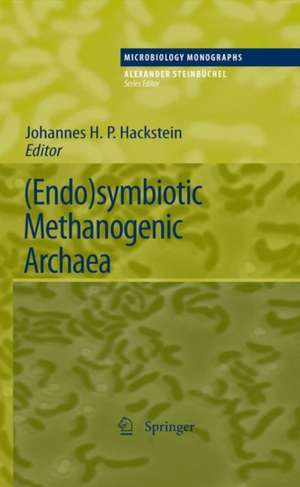(Endo)symbiotic Methanogenic Archaea: Microbiology Monographs, cartea 19
Editat de Johannes H.P. Hacksteinen Limba Engleză Hardback – 9 sep 2010
Methanogens are prokaryotic microorganisms that produce methane as an end-product of a complex biochemical pathway. They are strictly anaerobic archaea and occupy a wide variety of anoxic environments. Methanogens also thrive in the cytoplasm of anaerobic unicellular eukaryotes and in the gastrointestinal tracts of animals and humans. The symbiotic methanogens in the gastrointestinal tracts of ruminants and other “methanogenic” mammals contribute significantly to the global methane budget; especially the rumenhosts an impressive diversity of methanogens.
This makes this updated volume an interesting read for scientists and students in Microbiology and Physiology.
Din seria Microbiology Monographs
- 18%
 Preț: 953.82 lei
Preț: 953.82 lei - 5%
 Preț: 1594.75 lei
Preț: 1594.75 lei - 18%
 Preț: 956.33 lei
Preț: 956.33 lei - 18%
 Preț: 951.29 lei
Preț: 951.29 lei - 18%
 Preț: 952.09 lei
Preț: 952.09 lei - 18%
 Preț: 1224.36 lei
Preț: 1224.36 lei - 18%
 Preț: 939.00 lei
Preț: 939.00 lei - 18%
 Preț: 1547.49 lei
Preț: 1547.49 lei - 18%
 Preț: 946.41 lei
Preț: 946.41 lei - 18%
 Preț: 1224.68 lei
Preț: 1224.68 lei - 15%
 Preț: 645.47 lei
Preț: 645.47 lei - 18%
 Preț: 1227.21 lei
Preț: 1227.21 lei - 18%
 Preț: 941.05 lei
Preț: 941.05 lei - 18%
 Preț: 946.55 lei
Preț: 946.55 lei - 18%
 Preț: 945.62 lei
Preț: 945.62 lei - 18%
 Preț: 1112.15 lei
Preț: 1112.15 lei - 18%
 Preț: 955.70 lei
Preț: 955.70 lei - 18%
 Preț: 944.19 lei
Preț: 944.19 lei - 18%
 Preț: 954.62 lei
Preț: 954.62 lei - 18%
 Preț: 950.66 lei
Preț: 950.66 lei - 15%
 Preț: 645.47 lei
Preț: 645.47 lei - 15%
 Preț: 643.34 lei
Preț: 643.34 lei - 18%
 Preț: 1225.94 lei
Preț: 1225.94 lei - 18%
 Preț: 947.04 lei
Preț: 947.04 lei - 18%
 Preț: 1113.58 lei
Preț: 1113.58 lei
Preț: 947.35 lei
Preț vechi: 1155.30 lei
-18% Nou
Puncte Express: 1421
Preț estimativ în valută:
181.30€ • 196.86$ • 152.29£
181.30€ • 196.86$ • 152.29£
Carte tipărită la comandă
Livrare economică 22 aprilie-06 mai
Preluare comenzi: 021 569.72.76
Specificații
ISBN-13: 9783642136146
ISBN-10: 3642136141
Pagini: 320
Ilustrații: XIV, 238 p. 57 illus., 9 illus. in color.
Dimensiuni: 155 x 235 x 20 mm
Greutate: 0.5 kg
Ediția:2010
Editura: Springer Berlin, Heidelberg
Colecția Springer
Seria Microbiology Monographs
Locul publicării:Berlin, Heidelberg, Germany
ISBN-10: 3642136141
Pagini: 320
Ilustrații: XIV, 238 p. 57 illus., 9 illus. in color.
Dimensiuni: 155 x 235 x 20 mm
Greutate: 0.5 kg
Ediția:2010
Editura: Springer Berlin, Heidelberg
Colecția Springer
Seria Microbiology Monographs
Locul publicării:Berlin, Heidelberg, Germany
Public țintă
ResearchCuprins
Free-Living Protozoa with Endosymbiotic Methanogens.- Anaerobic Ciliates and Their Methanogenic Endosymbionts.- Symbiotic Methanogens and Rumen Ciliates.- The Methanogenic and Eubacterial Endosymbionts of Trimyema.- Termite Gut Flagellates and Their Methanogenic and Eubacterial Symbionts.- Methanogens in the Digestive Tract of Termites.- Methanogenic Archaea in Humans and Other Vertebrates.- Methanogens in the Gastro-Intestinal Tract of Animals.- Syntrophy in Methanogenic Degradation.- Hydrogenosomes.- Evolution of Prokaryote-Animal Symbiosis from a Genomics Perspective.
Textul de pe ultima copertă
This updated monograph deals with methanogenic endosymbionts of anaerobic protists, in particular ciliates and termite flagellates, and with methanogens in the gastrointestinal tracts of vertebrates and arthropods. Further chapters discuss the genomic consequences of living together in symbiotic associations, the role of methanogens in syntrophic degradation, and the function and evolution of hydrogenosomes, hydrogen-producing organelles of certain anaerobic protists.
Methanogens are prokaryotic microorganisms that produce methane as an end-product of a complex biochemical pathway. They are strictly anaerobic archaea and occupy a wide variety of anoxic environments. Methanogens also thrive in the cytoplasm of anaerobic unicellular eukaryotes and in the gastrointestinal tracts of animals and humans. The symbiotic methanogens in the gastrointestinal tracts of ruminants and other “methanogenic” mammals contribute significantly to the global methane budget; especially the rumenhosts an impressive diversity of methanogens.
This makes this updated volume an interesting read for scientists and students in Microbiology and Physiology.
Methanogens are prokaryotic microorganisms that produce methane as an end-product of a complex biochemical pathway. They are strictly anaerobic archaea and occupy a wide variety of anoxic environments. Methanogens also thrive in the cytoplasm of anaerobic unicellular eukaryotes and in the gastrointestinal tracts of animals and humans. The symbiotic methanogens in the gastrointestinal tracts of ruminants and other “methanogenic” mammals contribute significantly to the global methane budget; especially the rumenhosts an impressive diversity of methanogens.
This makes this updated volume an interesting read for scientists and students in Microbiology and Physiology.
Caracteristici
A valuable source of information for scientists in microbiology and biochemistry.- Presents the latest results in the field of methanogenic archaea.- Written by renowned scientists Includes supplementary material: sn.pub/extras
